News
FAO Regional Launch and Workshop on the Implementation of OCOP Country Projects in Asia and the Pacific

Group photo of the in-person participants at the OCOP regional event in Dhaka
©FAO/Kazi Riasat
Dhaka, 19-20 July 2023 – Over 200 participants from countries across the region of Asia and the Pacific gathered in the capital of Bangladesh and via remote live streams for the FAO Regional Launch and Workshop on the Implementation of the region’s Country Projects under the One Country One Priority Product initiative (OCOP). Bangladesh hosted this event as one of five OCOP demonstration countries across the globe, having been selected to implement a project at the forefront of this initiative that sets an example for the region of Asia and the Pacific.
The two-day event was officially opened by Jingyuan Xia, Director of FAO Plant Production and Protection Division (NSP) who highlighted the importance of the OCOP initiative on sustainable development of the value chains of Special Agricultural Products (SAPs) and contribution to achieving the FAO Strategic Framework 2022-31 and the Sustainable Development Goals.
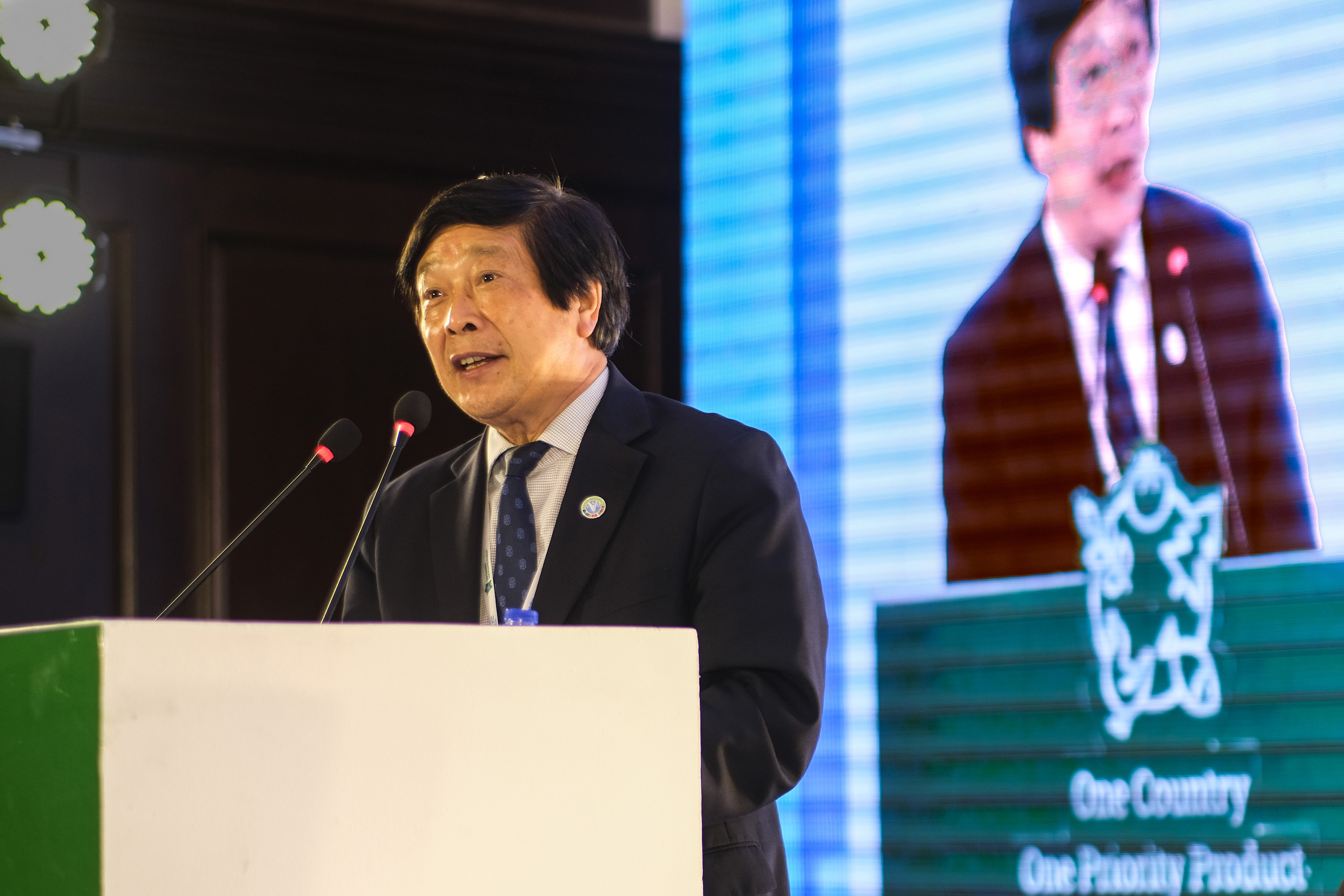
NSP Director Xia delivering his opening remarks to highlight key messages about the OCOP. ©FAO/Kazi Riasat.
Mr Md Ruhul Amin Talukder, Additional Secretary at the Ministry of Agriculture, Bangladesh, warmly welcomed the participants on behalf of the Government of Bangladesh. Mr Jong-Jin Kim, FAO Assistant Director-General for the Region of Asia and the Pacific, Mr Debasish Sarker, Director General of the Bangladesh Agricultural Research Institute, and Robert Simpson FAO Representative also welcomed the participants to the regional event. Participants were actively engaged in the sessions throughout the two-day event. They were keen to learn more, compare strategies in different countries and finalize their project proposals.
Activities during the Regional Launch Event and Workshop
On the first day of the event, the Regional Launch proceeded with keynote presentations focused on the progress of OCOP implementation. Mr Hafiz Muminjanov, OCOP Global Coordinator, presented the global perspective; Ms Xuan Li, OCOP Focal Point for Asia and the Pacific presented significant progress at the regional level and Mr Ruhul Amin Talukder, presented on country-level progress of the OCOP in Bangladesh, the region’s demonstration country. Later that afternoon, during the workshop on the implementation of OCOP country projects, National Focal Points from 12 selected OCOP potential project countries presented the status of their projects to promote their respective SAPs. Namely, presentations were about Bhutan, Cambodia, China, India, Indonesia, Mongolia, Nepal, Pakistan, Papua New Guinea, Samoa, Thailand and Viet Nam shared overviews of the concept notes they have formulated, their three-year workplans and the establishment of National Task Forces in each country. Following this tour of OCOP implementation across the region, selected stakeholders described how they can promote synergies with the OCOP Initiative in the areas of research, innovation resource mobilization and partnerships. While the workshop was taking place, a Jackfruit Faire was open to demonstrate the fruits and processed products produced by small-scale farmers and entrepreneurs of Bangladesh, alongside exhibits of SAPs from other OCOP countries in the region. In the evening, a cultural program was organized by the FAO Country Office, including performances of Bangladeshi folk music and songs.
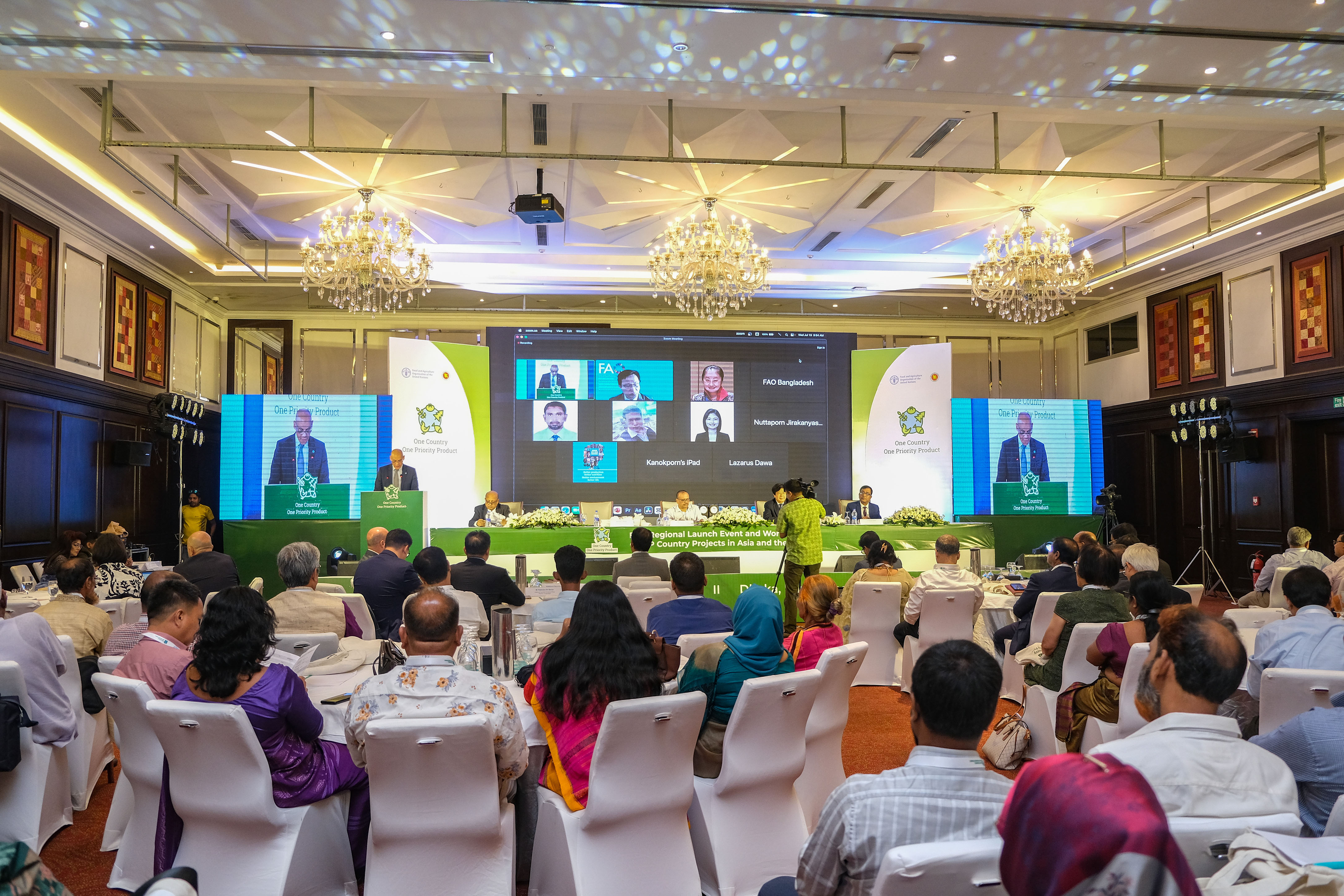 | 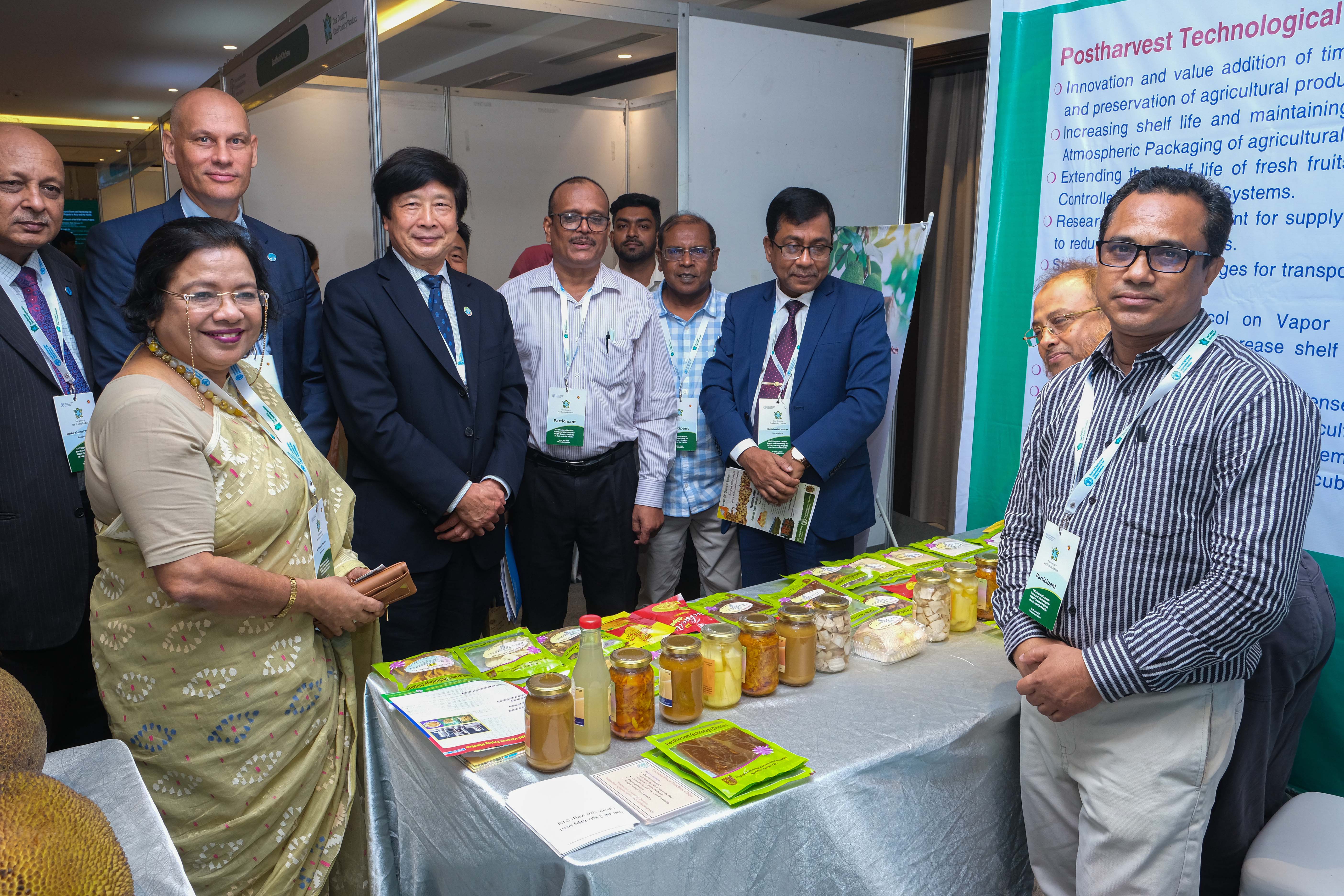 |
Participants in the venue of the Regional Launch Event and Workshop. ©FAO/Kazi Riasat. | NSP Director Xia with FAO Representative Robert Simpson at the Jackfruit Faire. ©FAO/Kazi Riasat. |
On the second day of the event, participants visited the Post-Harvest Technology Division & Jackfruit orchard developed in the Bangladesh Agriculture Research Institute (BARI) and the jackfruit orchards in farmers’ fields located north of Dhaka in Kathalbari, Joydebpur and Gazipur to meet with farmers and traders. The participants learned about post-harvest technologies for jackfruit developed by BARI which is the leading research and innovation centre in the country. Upon returning to the event venue, the workshop participants split into three groups for parallel discussions on (1) coordination and synergies; (2) technical support and capacity development; and (3) multistakeholder engagement and resource mobilization. The suggestions and feedback from these discussions were then presented to all those gathered for the event, setting a platform for teams to implement OCOP activities across the region in a well-informed, coordinated manner.
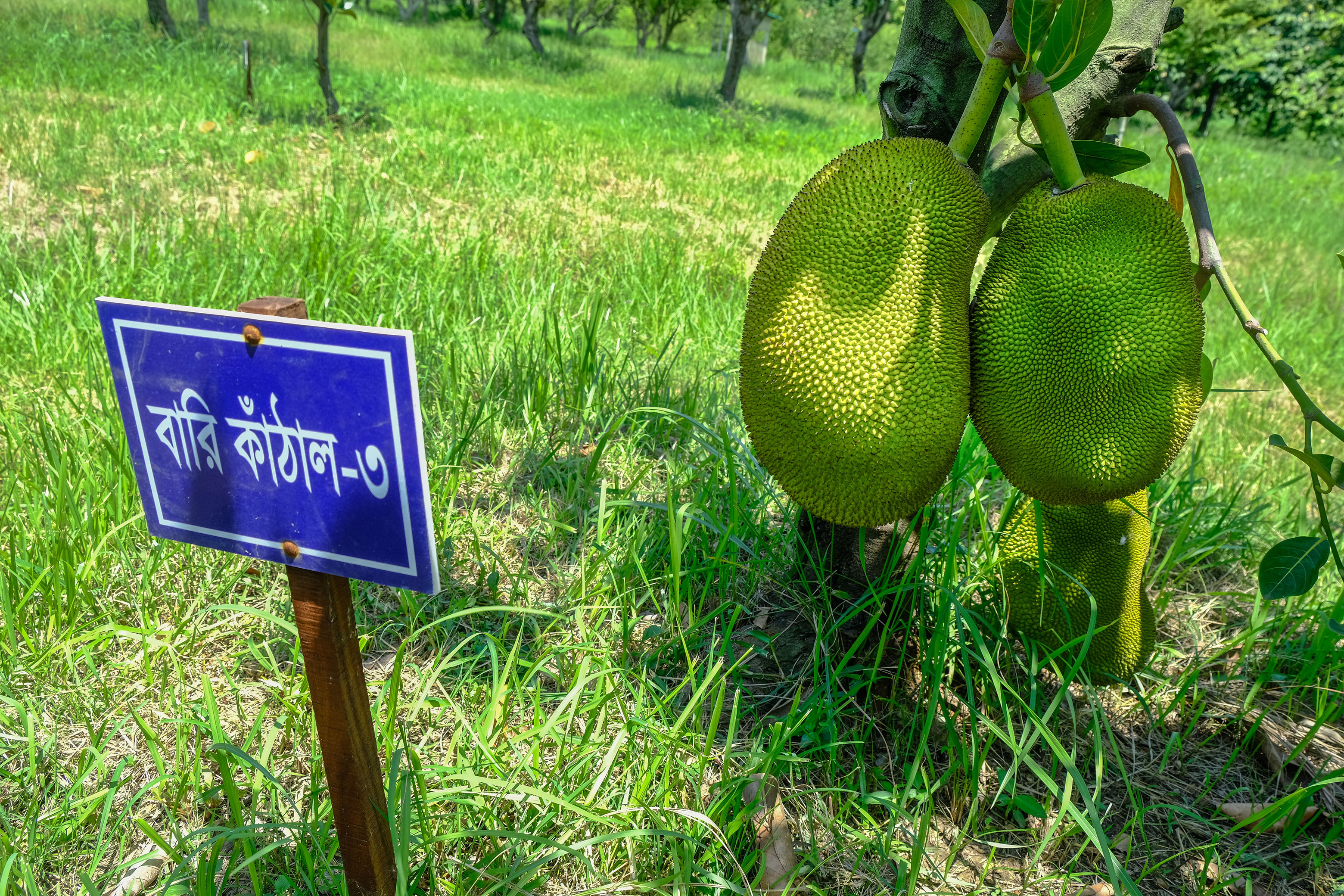 | 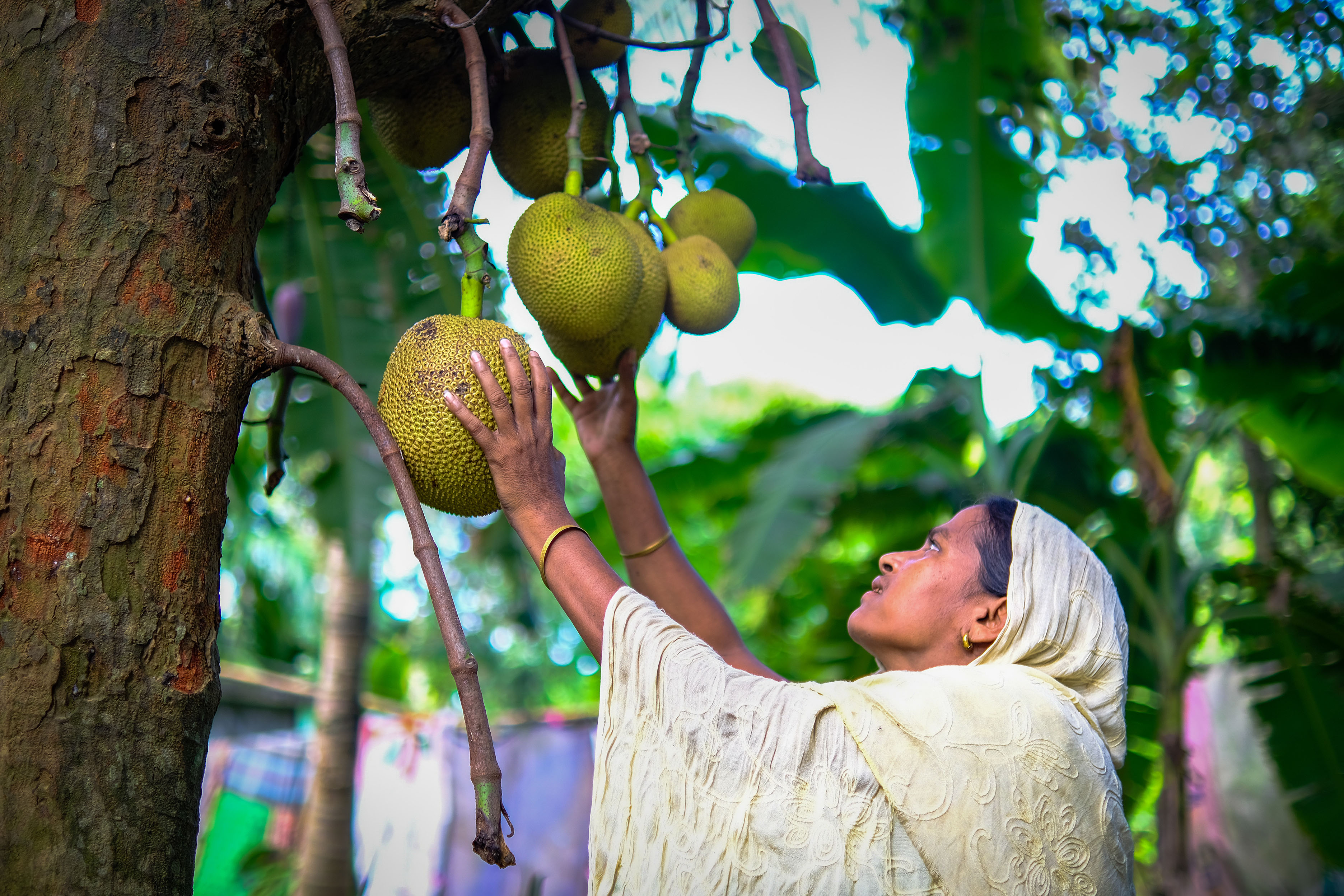 |
A new variety of jackfruit called BARI-3 growing in a BARI research field. | A small-scale farmer looking after the jackfruits growing on her tree. |
In his concluding remarks for this well-attended and fruitful event, NSP Director Xia reiterated the importance of getting everybody on board to better understand the OCOP, developing the road map to ensure this initiative can be successfully promoted to reach farmers’ fields, through strengthening collaboration and partnership.
